Online Antioch School Board candidate forum Monday night Sept. 28
Saturday, September 26th, 2020Sponsored by Rocketship Delta Prep Parent Organizing Committee and Grace Bible Fellowship.

To watch the event via livestream click here.
Sponsored by Rocketship Delta Prep Parent Organizing Committee and Grace Bible Fellowship.

To watch the event via livestream click here.
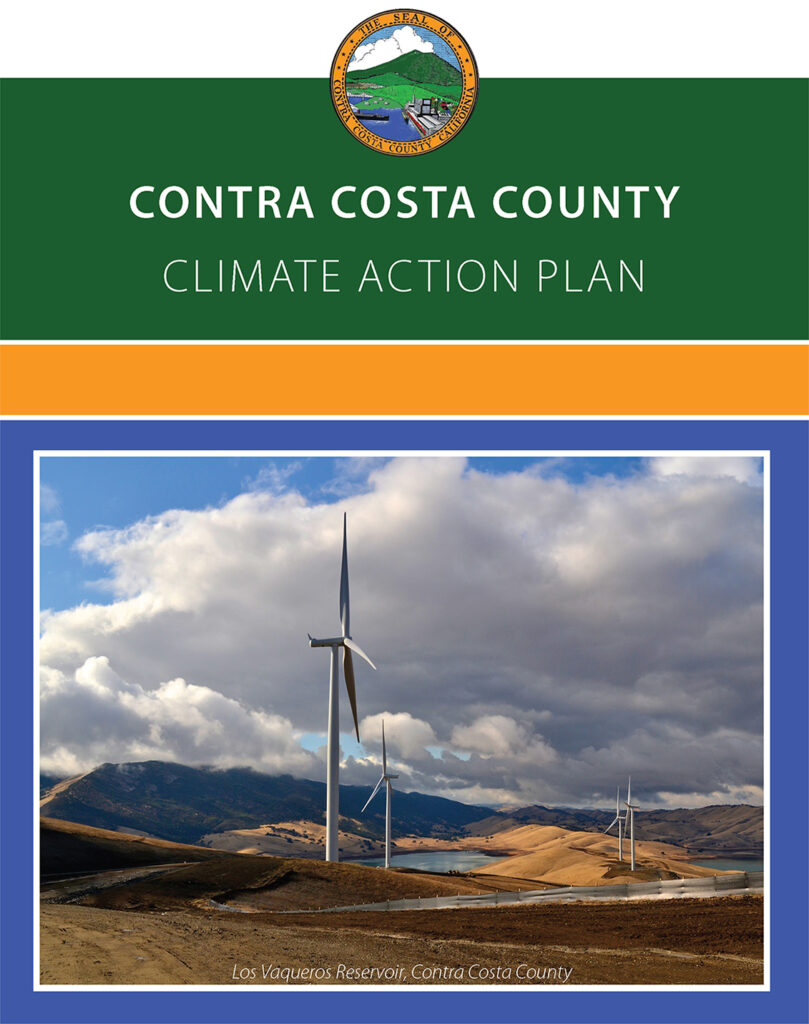 By Daniel Borsuk
By Daniel Borsuk
For a county with five major petroleum refineries, the Contra Costa County Board of Supervisors took a major step in addressing climate change by adopting a three-page climate emergency declaration. 43116_BO_ADOPT Climate Emergency Resolution
About 30 people supported the resolution’s nine items dealing with the global environmental issue during the supervisors’ tele-conferenced Board meeting on Tuesday. Supervisors also received a positive COVID-19 report from Contra Costa County Public Health Department officials and a report on the Nov. 3 California General and National Election from Contra Costa County Clerk-Recorder Deborah Cooper.
Upon adopting the climate change resolution, supervisors positioned the county in support of the State of California’s goals to cut greenhouse gases by 40 percent below 1990 levels by 2030, achieve net carbon neutrality by 2045, and provide 100 percent of the State’s electricity from clean energy sources by 2045.
The Board’s action also forms an interdepartmental task force of all county department heads or senior deputies that will focus on “urgently implementing the County’s Climate Action Plan – as currently adopted ….and identifying additional actions, policies, and programs the county will undertakes to reduce and adapt to the impacts of a changing climate. This task force should report to the Board of Supervisors through the County Sustainability Commission and the Board’s Sustainability Committee on a semi-annual basis starting in March 2021. Reports to the Board of Supervisors shall be discussion items for the Board.”
The resolution states that “Contra Costa County should develop policies to require all new construction to be fully electric through the adoption of Reach Building Codes.”
“Contra Costa County will prioritize the implementation of its Climate Action Plan in order to achieve greenhouse gas reductions as soon as possible and will consider equity and social justice issues in the implementation of the plan,” the Board’s resolution states.
In addition, the resolution states: “that health, socio-economic, and racial equity considerations should be included in policymaking and climate solutions at all levels and across all sectors as the consequences of climate change have significant impacts on all County residents, especially the young, the elderly, low-income, or communities of color and other vulnerable populations.”
Initially it appeared Board Chair Candace Andersen, who says she drives a hybrid car, was leaning to cast a “no” vote on the resolution, but after listening to about 30 speakers mostly in support of the resolution, the Danville-based Supervisor voted in support of the resolution. The Supervisor said she had an issue about the urgency of the state shifting from a fossil fueled based economy to an electric powered based economy that would potentially be more energy efficient and less environmentally harmful.
Jackie Garcia, a Lafayette-based builder, asked Supervisors to pass the resolution because “People want energy-efficient houses. People don’t use gas stoves anymore. They use energy efficient electric stoves.”
“This resolution requires immediate action,” said Supervisor Karen Mitchoff of Pleasant Hill who also serves on the commission of the Bay Area Air Quality Management District. “I will support this resolution.”
Incoming Board Chair for 2021 Supervisor Diane Burgis of Brentwood, who said she has worked on environmental issues, especially related to water, said “I will support this resolution because it will directly affect our future way of life in Contra Costa County.”
Supervisor Federal Glover of Pittsburg, who was elected to serve as Vice Chair for 2021 by his colleagues provided he is reelected in November’s election against County Assessor Gus Kramer, said “This is a good first step. It gives people notice.”
In passing the resolution that more than 1,000 other California cities, counties and regional governmental agencies have done before Tuesday’s supervisors’ meeting, the Contra Costa resolution “declares a climate emergency that threatens the long-term economic and social well-being, health, safety, and security of the County, and that urgent action by all levels of government is needed to immediately address this climate emergency.”
“Real Good News” on the COVID-19 Front
Contra Costa County Public Health Department Director Anna Roth informed supervisors there is “real good news” concerning COVID-19. She expects the state to announce perhaps on Sept. 29 that the county’s COVID-19 status will be upgraded from purple to red.
The color change will mean the county will probably be allowed to open more businesses that have been shuttered since the public health shutdown order went into effect in March.
Roth expects some K-12 schools, as many as 35, could reopen for students with proper health protocols in place. Roth said Contra Costa County Superintendent of Schools Lynn Mackey will oversee the reopening of the schools.
Roth reported there have been 15,156 COVID-19 patients in the County since the outbreak of the flu in March. There have been 202 deaths in the county since March. In the past 24 hours there were 52 COVID-19 patients reported in the county hospital and no deaths have been reported, she said. “Our County death rate is less than the national average,” she said.
In a push to increase the number of people who are tested for COVID-19, Contra Costa County Public Health Officer Dr. Chris Farnitano said about 330,000 residents have been tested. “That’s still not enough,” said Dr. Farnitano, who said the County will open a drive-up test site at the Bay Point Health Center in October.
Dr. Farnitano said the county will start to give free flu shots at the County’s Antioch, Concord, Richmond and San Ramon drive up sites. “Vaccination is important because it is difficult to tell the difference between the flu and COVID,” he said.
More Than 700,000 Ballots Expected for Nov. 2 Election
The Contra Costa County Office of Elections expects to mail more than 700,000 ballots to registered voters for the Nov. 3 election, up from 687,000 ballots mailed last November to registered voters, said Contra Costa County Clerk-Recorder and Registrar of Voters Deborah Cooper.
“We encourage people to stay safe and vote by mail,” said Cooper. There will also be 37 ballot drop boxes around the County so voters can drop off ballots 24/7 from Oct. 5 through Nov. 3. Official ballots will be mailed to voters on Oct. 5, but if a registered voter has not received a ballot by Oct. 19 they should contact the Elections Office, (925) 335-7800.
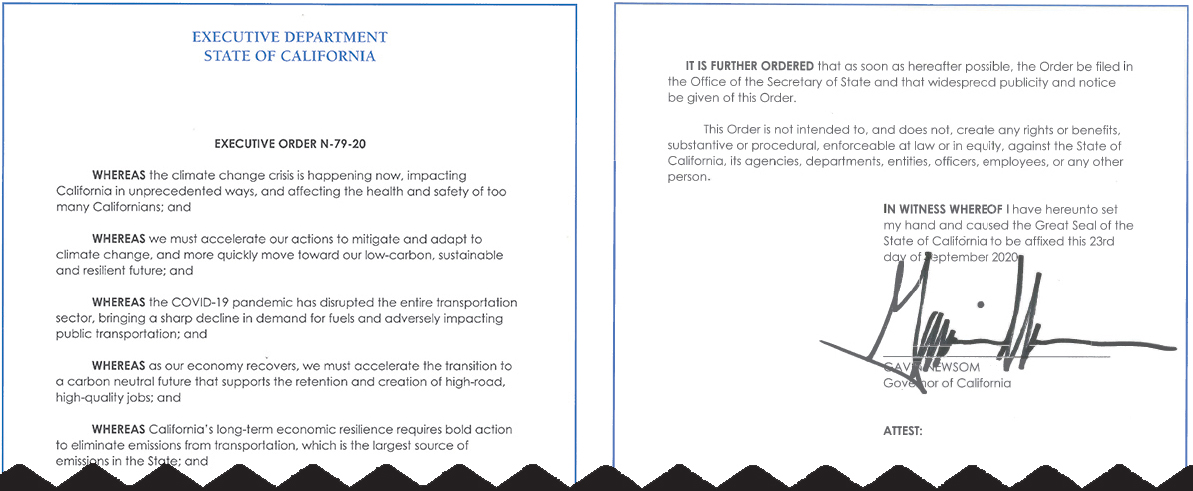
To “drastically reduce demand for fossil fuel in California’s fight against climate change”
Transportation currently accounts for more than 50 percent of California’s greenhouse gas emissions
Zero-emission vehicles are a key part of California’s clean, innovation economy – already California’s second largest global export market
Order also directs state to take more actions to tackle the dirtiest oil extraction and support workers and job retention and creation as we make a just transition away from fossil fuels
SACRAMENTO – Governor Gavin Newsom today announced that he will aggressively move the state further away from its reliance on climate change-causing fossil fuels while retaining and creating jobs and spurring economic growth – he issued an executive order requiring sales of all new passenger vehicles to be zero-emission by 2035 and additional measures to eliminate harmful emissions from the transportation sector. (The text of today’s executive order can be found here and a copy can be found here.)
The transportation sector is responsible for more than half of all of California’s carbon pollution, 80 percent of smog-forming pollution and 95 percent of toxic diesel emissions – all while communities in the Los Angeles Basin and Central Valley see some of the dirtiest and most toxic air in the country.
“This is the most impactful step our state can take to fight climate change,” said Governor Newsom. “For too many decades, we have allowed cars to pollute the air that our children and families breathe. Californians shouldn’t have to worry if our cars are giving our kids asthma. Our cars shouldn’t make wildfires worse – and create more days filled with smoky air. Cars shouldn’t melt glaciers or raise sea levels threatening our cherished beaches and coastlines.”
Following the order, the California Air Resources Board will develop regulations to mandate that 100 percent of in-state sales of new passenger cars and trucks are zero-emission by 2035 – a target which would achieve more than a 35 percent reduction in greenhouse gas emissions and an 80 percent improvement in oxides of nitrogen emissions from cars statewide. In addition, the Air Resources Board will develop regulations to mandate that all operations of medium- and heavy-duty vehicles shall be 100 percent zero emission by 2045 where feasible, with the mandate going into effect by 2035 for drayage trucks. To ensure needed infrastructure to support zero-emission vehicles, the order requires state agencies, in partnership with the private sector, to accelerate deployment of affordable fueling and charging options. It also requires support of new and used zero-emission vehicle markets to provide broad accessibility to zero-emission vehicles for all Californians. The executive order will not prevent Californians from owning gasoline-powered cars or selling them on the used car market.
California will be leading the nation in this effort – joining 15 countries that have already committed to phase out gasoline-powered cars and using our market power to push zero-emission vehicle innovation and drive down costs for everyone.
By the time the new rule goes into effect, zero-emission vehicles will almost certainly be cheaper and better than the traditional fossil fuel powered cars. The upfront cost of electric vehicles are projected to reach parity with conventional vehicles in just a matter of years, and the cost of owning the car – both in maintenance and how much it costs to power the car mile for mile – is far less than a fossil fuel burning vehicle.
The executive order sets clear deliverables for new health and safety regulations that protect workers and communities from the impacts of oil extraction. It supports companies who transition their upstream and downstream oil production operations to cleaner alternatives. It also directs the state to make sure taxpayers are not stuck with the bill to safely close and remediate former oil fields. To protect the health and safety of our communities and workers, the Governor is also asking the Legislature to end the issuance of new hydraulic fracturing permits by 2024.
The executive order directs state agencies to develop strategies for an integrated, statewide rail and transit network, and incorporate safe and accessible infrastructure into projects to support bicycle and pedestrian options, particularly in low-income and disadvantaged communities.
This action continues the Governor’s commitment to strengthening California’s resilience while lowering carbon emissions – essential to meeting California’s air quality and climate goals. In the last six months alone, the California Air Resources Board has approved new regulations requiring truck manufacturers to transition to electric zero-emission trucks beginning in 2024 and the Governor signed an MOU with 14 other states to advance and accelerate the market for electric medium- and heavy-duty vehicles. Last fall, California led a multi-state coalition in filing a lawsuit challenging the U.S. Environmental Protection Agency’s attempt to revoke portions of a 2013 waiver that allows the state to implement its Advanced Clean Car Standards.
Last September, Governor Newsom took action to leverage the state’s transportation systems and purchasing power to strengthen climate mitigation and resiliency and to measure and manage climate risks across the state’s $700 billion pension investments. To mitigate climate threats to our communities and increase carbon sequestration, the Governor invested in forest health and fuel reduction and held utilities accountable for building resiliency. The Governor also directed state agencies to develop a comprehensive strategy to build a climate-resilient water system and made a historic investment to develop the workforce for California’s future carbon-neutral economy.

Jim Frazier
SACRAMENTO – Assemblymember Jim Frazier (D-Fairfield) announced today that he plans to introduce legislation in the upcoming session to fundamentally change the way California reduces greenhouse gas emissions.
“While I believe the work the California Air Resources Board (CARB) has been doing is laudable, we need to shift gears and address the main cause of carbon emissions in California, and right now, that is unquestionably wildfires,” said Frazier. “The data is undeniable and staggering.”
According the U.S. Geological Survey, in 2018 alone, the wildfires in California were estimated to have released emissions equivalent to roughly 68 million metric tons of carbon dioxide. By contrast, after seven years of reduction efforts from Cap and Trade funded projects to date, is estimated to be 45 million metric tons – at the cost of billions of dollars.
Frazier went on to say that he believes CARB needs to “pause and think” carefully about their programs and overall efficacy of the resources devoted to them, and reprioritize Cap and Trade dollars to address the immediate threat and environmental devastation that wildfires are causing. In addition to the further advancement of global warming, these fires result in property damage, loss of life, economic peril, and long-term health issues.
“The science and statistics of the devastation that wildfires are causing are not just limited to the land. These fires are pumping more pollution – far more toxic – than the burning of fossil fuels, and we must take a critical look at how we dedicate our precious financial resources to their reduction. As we know, wildfires are a major contributor to the advancement of global warming.”
Frazier will introduce a bill this December.

By John Fout, Community & Media Relations Specialist, Contra Costa County Office of Communications & Media
At their meeting on Tuesday, September 22, 2020, the Contra Costa County Board of Supervisors unanimously passed an urgency ordinance that continues a moratorium on certain evictions for residential tenants in the County through January 31, 2021. Urgency Ordinance No. 2020-25 also continues a moratorium on certain residential rent increases through January 31, 2021. The Ordinance is retroactive to September 1, 2020.
Contra Costa County’s urgency ordinance provides additional protections to the state’s COVID-19 Tenant Relief Act of 2020 (the Act), which passed and took effect immediately on August 31, 2020. The Act extends eviction protections for residential tenants experiencing financial hardship related to COVID-19.
“The urgency ordinance demonstrates the Board’s continued commitment to protect residents struggling with the unexpected economic hardship caused by the COVID-19 pandemic,” said Supervisor Candace Andersen, Board Chair. “We continue to seek ways to support renters and landlords, and hope that all parties will resolve to work together during this challenging time.”
This law applies to properties in all 19 cities in the County and in all unincorporated areas. To the extent that a city has adopted a law on the same subject matter, then the city’s provisions would apply in that city.
Protections granted to residential renters:
Read the full document Ordinance No. 2020-25 (PDF). Answers to Frequently Asked Questions (FAQs) regarding this ordinance will be available and updated on the County website soon.
For information and resources, visit Contra Costa County at www.contracosta.ca.gov. For COVID-19 updates, visit Contra Costa Health Services at https://cchealth.org/coronavirus. If you have questions about the coronavirus, contact the multilingual Call Center at 1-844-729-8410, open daily from 8 am to 5 pm. For assistance after hours in multiple languages, please call 211 or 800-833-2900 or text HOPE to 20121.
By Timothy Leong, Public Information Officer, CCCCD
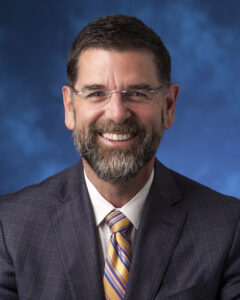
Dr Bryan Reece. Photo: Norco College.
The Contra Costa Community College District (CCCCD) Governing Board held a special public meeting on Tuesday, September 22, 2020, and today is announcing their decision to begin contract negotiations with Dr. Bryan Reece to become the next Chancellor. The goal will be to place the contract for public review and approval at their regular meeting scheduled for Wednesday, October 14, 2020.
The announcement was made following a nationwide search that began in January 2020. The selection process was paused in both March and April due to the transition to remote operations as a result of the pandemic and was restarted in September. Public forums were held last week for the finalist and a final interview was completed by the Governing Board.
Barrett praised the dedication and work conducted by the Search Committee and Collaborative Brain Trust Senior Consultant Dr. Brice Harris, a longtime California community college educator and Chancellor Emeritus of the California Community Colleges. In addition, the Governing Board acknowledged the hundreds of faculty, classified professionals, managers and community leaders who participated in the public forums and submitted comments to the trustees for consideration prior to their final decision.
About Dr. Bryan Reece

Dr. Reece with a Norco College graduate. Photo from his website.
Until last year, Reece was president of Norco College in Riverside County, California where he oversaw “approximately 450 employees, 15,000 students and a service area with over 300,000 residents. Expanded student enrollment by 9.6% and student completion of academic goals by 18.3% with transfers to the University of California (UC) system improving by 50%. Narrowed the equity gap with completion for students of color improving by 26%. Increased fundraising by 117%,” according to his website.
Also on his website, Reece shares about himself.
“I have been working in higher education for 30 years, with 15 years of senior management experience including a decade of community college administration (College President, VP of Academic Affairs, and Dean) and five years of private sector management. I hold a BA, MA and Ph.D. from the University of Southern California (USC). I taught Political Science as a tenured community college faculty member for 19 years and have a documented record of moving community colleges in directions that improve the academic success for students across all groups and have particular expertise with student populations from historically under-served communities. I have worked extensively with legislative bodies and government agencies at the local, state and federal levels and have a record of success with public-private partnerships and fundraising.”
According to his LinkedIn account, Reece attended USC from 1984 through 1990 for his undergrad and master’s degrees, and returned to the school from 2001-2005 for his doctorate.
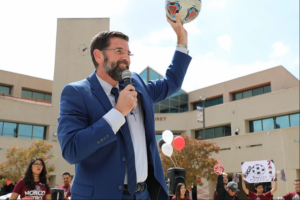
Dr. Reece at a Norco College soccer pep rally. Photo from his website.
Last year, he founded the National Policy Agenda for Community Colleges (NPACC) to use community colleges to address racism and discrimination in the U.S. According to his website, “The primary goal of NPACC is to address social justice and equity at the national level through the work of American community colleges. NPACC is supported by a grassroots group of over 50 volunteers, including trustees, college presidents, administrators, faculty, staff, CC alumni, community members, and elected officials. We believe racism and discrimination in America must be addressed through a national strategy that recognizes and supports the leadership role community colleges play in working with students from historically underserved communities.”
According to his Twitter feed, Reece is writing a book about community colleges. In a July 23rd tweet, he introduced a series of essays based on his book, entitled “Community Colleges: A Good Kind of Subversion – An Ongoing Essay Series on Educational Inequities and How to Solve Them.”
According to the About page on his website, Reece was a cow milker at a dairy throughout high school and college in the 1980’s, providing him with both the necessary experience for fundraising and a firm grip when shaking hands.
Allen Payton contributed to this report.
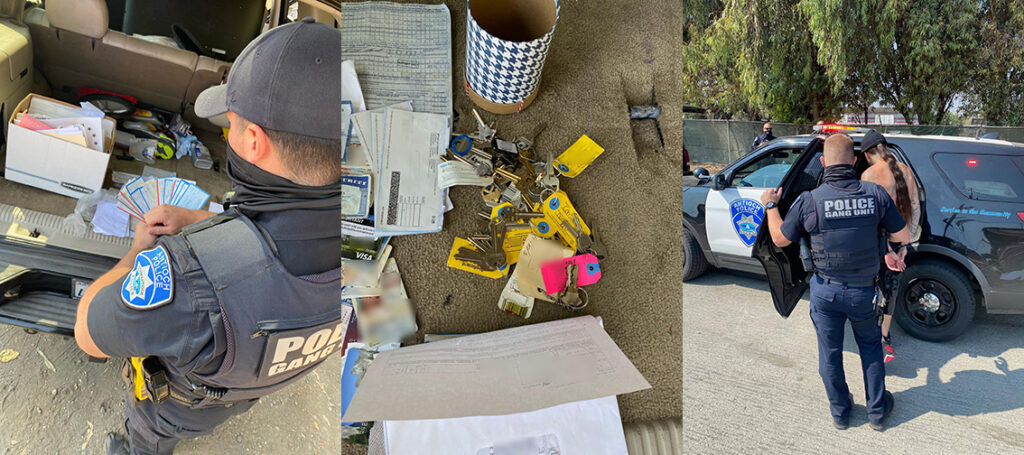
Photos by APD.
By Antioch Police Department
Tuesday, at about 11:20 AM, #APDPOPTeam Officers Marcotte and Rombough conducted a traffic stop at L and West 18th Streets. They learned the driver was on a form of parole known as Post Release Community Supervision. Individuals who are placed on this type of supervision agree to subject themselves, their vehicles, along with homes and property, to warrantless searches by law enforcement. When officers searched his vehicle, they discovered numerous stolen checks that were forged and paid to the driver in amounts ranging from $2,000 to $10,000. They also discovered stolen identification and social security cards, along with several mailbox access keys. Said driver was fitted with chrome bracelets and received a courtesy shuttle ride from APD to the County Jail.
Many of you have installed locking mailboxes to help prevent mail theft, but individuals with access keys can still defeat them. If you can avoid it, try not to mail checks from your residential mailbox, and instead drop them off directly at the post office, or use online bill pay. You can also sign up for a free service from the US Postal Service called Informed Delivery, which will send you a daily email with images of the mail arriving in your mailbox that day. Here’s a link on how to sign up: https://informeddelivery.usps.com
You know your neighborhoods better than anyone, so please continue to call us if you spot anything suspicious. Our non-emergency Dispatch number is (925) 778-2441 or 9-1-1 if you think it’s an emergency. #antiochpdca
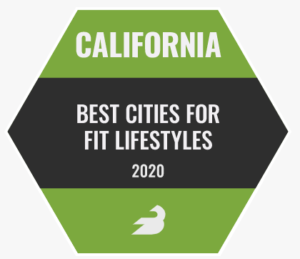 With the pandemic restricting our usual exercise regimes due to social distancing regulations, many Americans have had to adapt their fitness goals and align them with at-home workouts. Combined with the fact that many of us are comfort eating while in the midst of a global health crisis, this may have led some to gain the so-called, ‘Quarantine 15’ without even realizing. However, the good news about working or studying from home is not having to worry about your daily commute taking up too much time that could be used to achieve your at-home fitness goals for the day. But what happens if you don’t have adequate space in your home and don’t live near an open outdoor area in order to work out?
With the pandemic restricting our usual exercise regimes due to social distancing regulations, many Americans have had to adapt their fitness goals and align them with at-home workouts. Combined with the fact that many of us are comfort eating while in the midst of a global health crisis, this may have led some to gain the so-called, ‘Quarantine 15’ without even realizing. However, the good news about working or studying from home is not having to worry about your daily commute taking up too much time that could be used to achieve your at-home fitness goals for the day. But what happens if you don’t have adequate space in your home and don’t live near an open outdoor area in order to work out?
BarBend.com, the world’s leading strength training resource and news outlet, compiled a comprehensive list of the top fittest cities across California, using data backed by studies based on a variety of factors. These were combined to create an overall fitness score out of 100 for each city on the list. Fitness factors in this study include exercise opportunities, access to healthy food, air pollution, drinking water violations, physical inactivity, obesity and smoking, amongst others.
It was found that Antioch emerged in 87th position with an overall fitness score of 83.58. The city has a high rate of exercise opportunities at 970 (per 1,000 people) suggesting that the surrounding environment can play a key role in determining people’s fitness level.
According to the CHR’s county health ranking model, “individuals who live closer to sidewalks, parks and gyms are more likely to exercise”, therefore access to exercise opportunities is crucial in maintaining a healthy population. Additionally, residents who live in neighborhoods with access to grocery stores that allow them to obtain healthy foods, such as fresh fruit and vegetables, are more likely to have healthier diets than those who do not have access to these kinds of supermarkets. Considering the Golden State is abundant in national parks and natural landscapes, the great outdoors provides the perfect background for recreational activities, such as rock climbing, hiking, swimming and cycling. Additionally, Antioch was found to have low air pollution, low rates of physical inactivity, obesity and smoking.
View the top cities for fitness across California (including Antioch data)
“As you can see, there are a variety of external factors that can have an impact on a town’s overall fitness, which can be detrimental to the population’s health, especially where some don’t have access to sufficient space for their at-home workouts,” says Max Whiteside from BarBend.com. “If this is the case, you can still try and keep fit while going about your work for the day by standing, instead of sitting in front of your laptop, taking frequent breaks in which you can complete some lunges and squats, making mobility work a part of your daily routine. Remember your own bodyweight can also be a useful workout tool!”